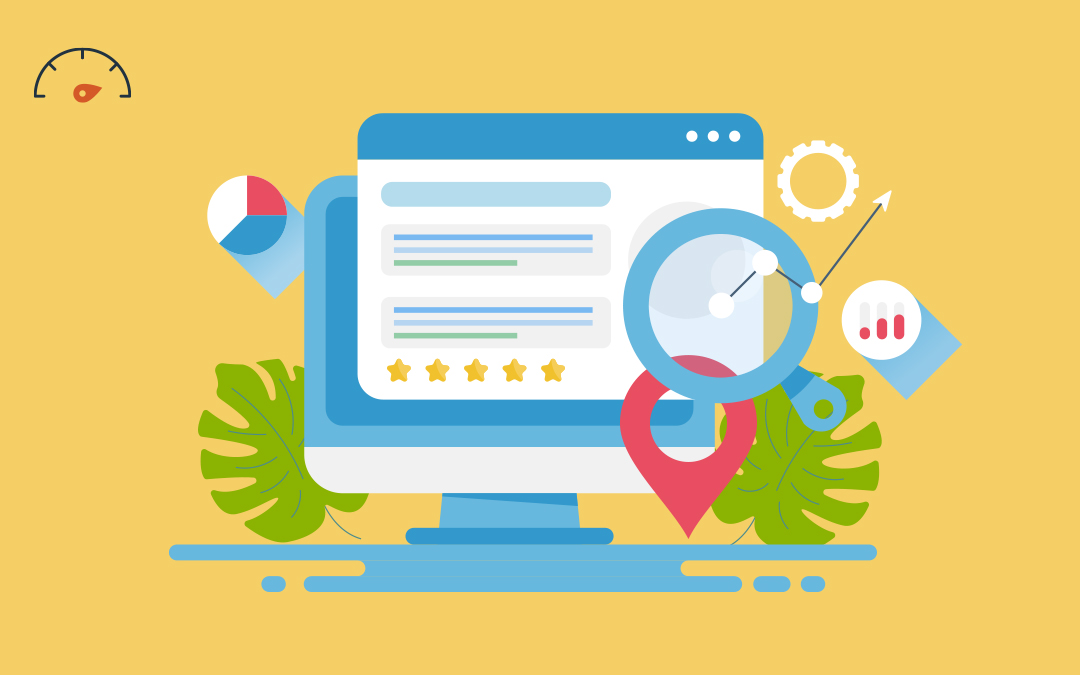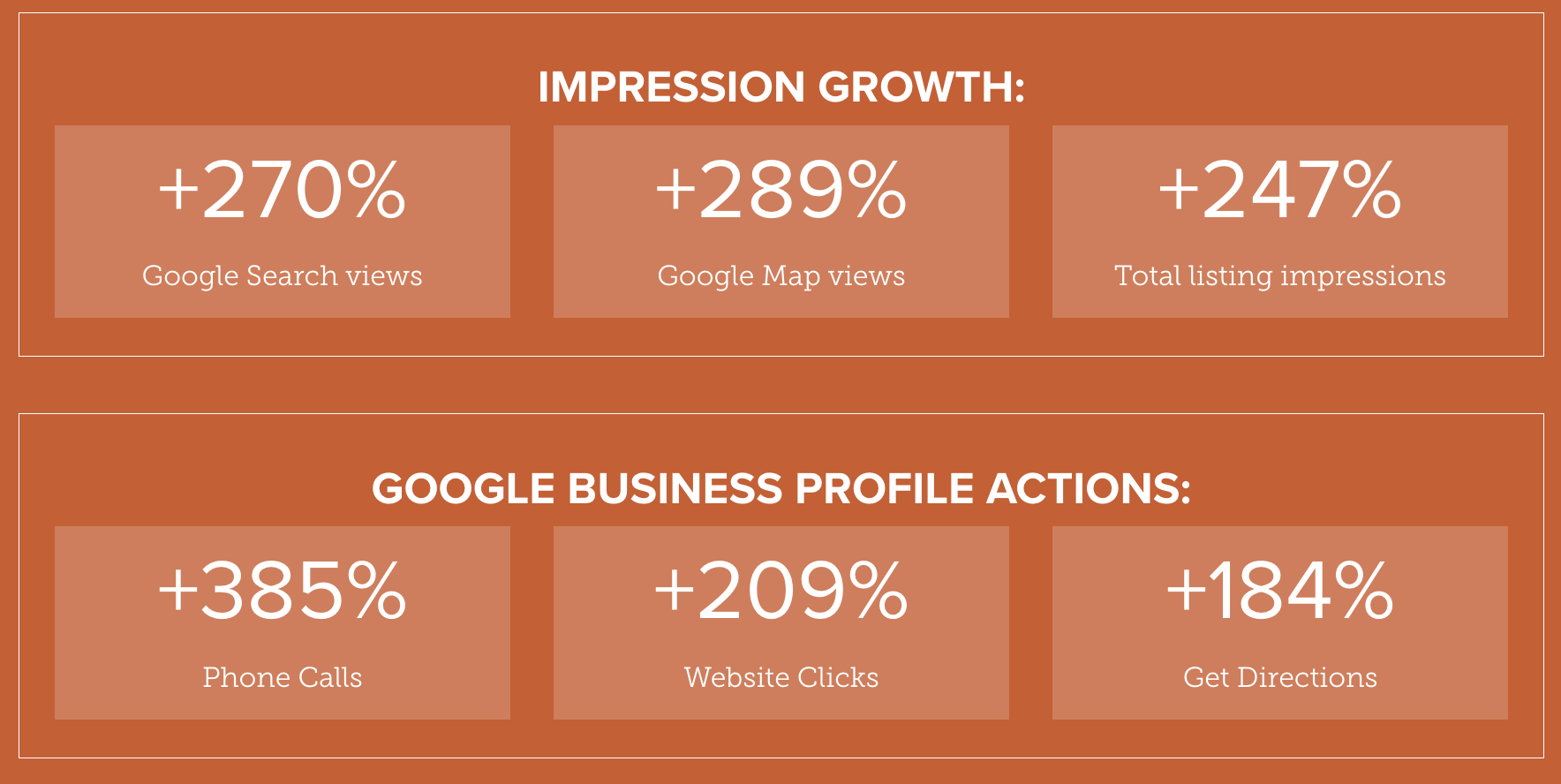Key Moments
- What Is Local SEO?
- Why Is Local SEO Important?
- How Does Local SEO Work?
- How to Optimize for Local Search Results
- Best Local SEO Tools for Beginners
What Is Local SEO?
Local SEO is a strategy to optimize search engine visibility and ranking in local search results to increase online traffic, brand awareness, and customers in your area.
Long-story short: Local SEO helps businesses appear higher in local search results.
Why Is Local SEO Important?
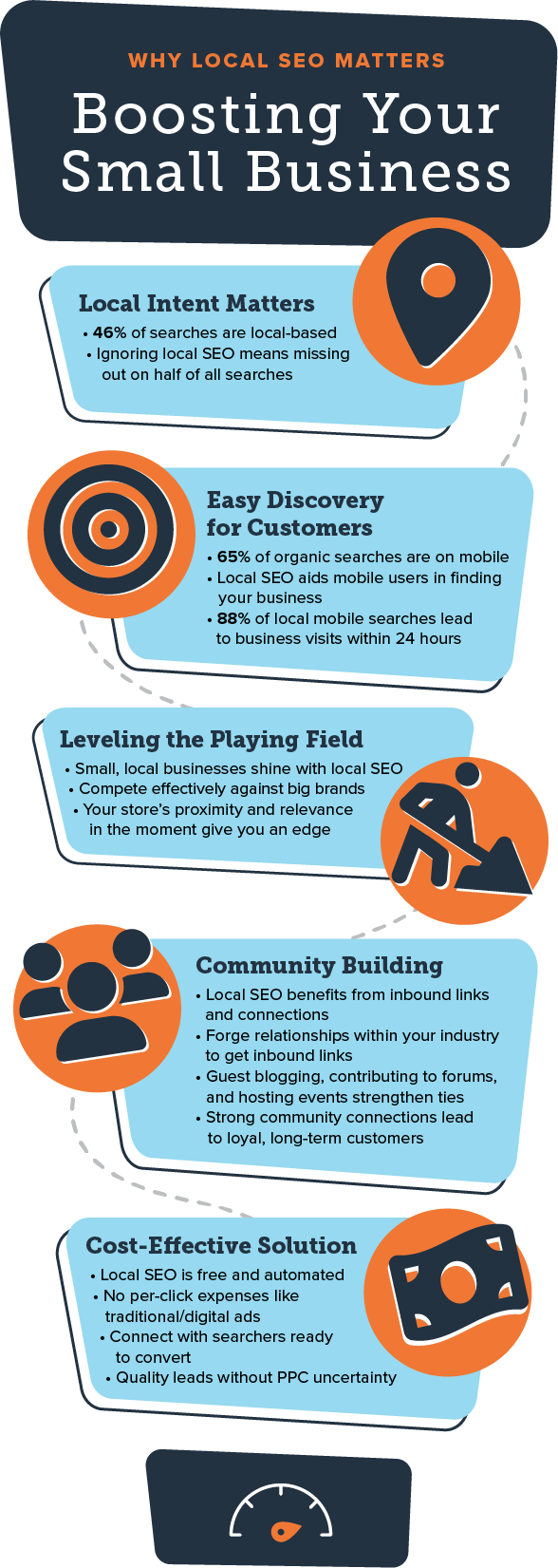
Small businesses need local SEO because it’s incredibly effective at boosting traffic and attracting new customers. Our clients agree.
Here’s why our small businesses perform better after optimizing for local SEO.
Many Searches Have Local Intent
46% of all searches are local or location-based, so if you’re not using local SEO strategies, you’re not ranking for nearly half of all searches.
Customers Can Find You Better
Local search helps customers find your business–specifically on their mobile devices. Nearly 65% of organic search engine visits happen on a mobile phone, and 88% of local mobile searches result in a call or visit to your business within 24 hours.
In other words, local search positions your business as a quick solution to customers seeking an immediate answer. Without local SEO, you’ll struggle to connect with people when they need your products/services most.
Local Businesses Are Competitive
Many times, it’s a losing battle when trying to compete against large businesses. They dominate online spaces and have seemingly unlimited ad budgets.
But with local SEO, local businesses have the advantage. You’re often closer and more relevant to the person searching, so you stand a chance to win against big brands.
You Build Relationships With Your Community
A big part of a strong local SEO strategy is inbound links. To get those backlinks, you need to reach out to people in your industry and create a connection so they’re willing to help you.
Whether your small business tries guest blogging, broken link building strategies, contributing to industry forums, or hosting local events, all of this outreach strengthens connections with people in your community, which helps you retain customers long-term.
Local Search Is Free
Both traditional and digital advertising cost money, time, and major effort. But local search optimization can be automated in many ways and is completely free to start and use.
Plus, it produces more valuable leads. Instead of paying for clicks that might not turn into customers like with paid advertising campaigns, local search optimization puts you in front of people who are already searching for your products and services, making them much more likely to convert than top-of-funnel customers clicking on PPC ads.
How Does Local SEO Work?
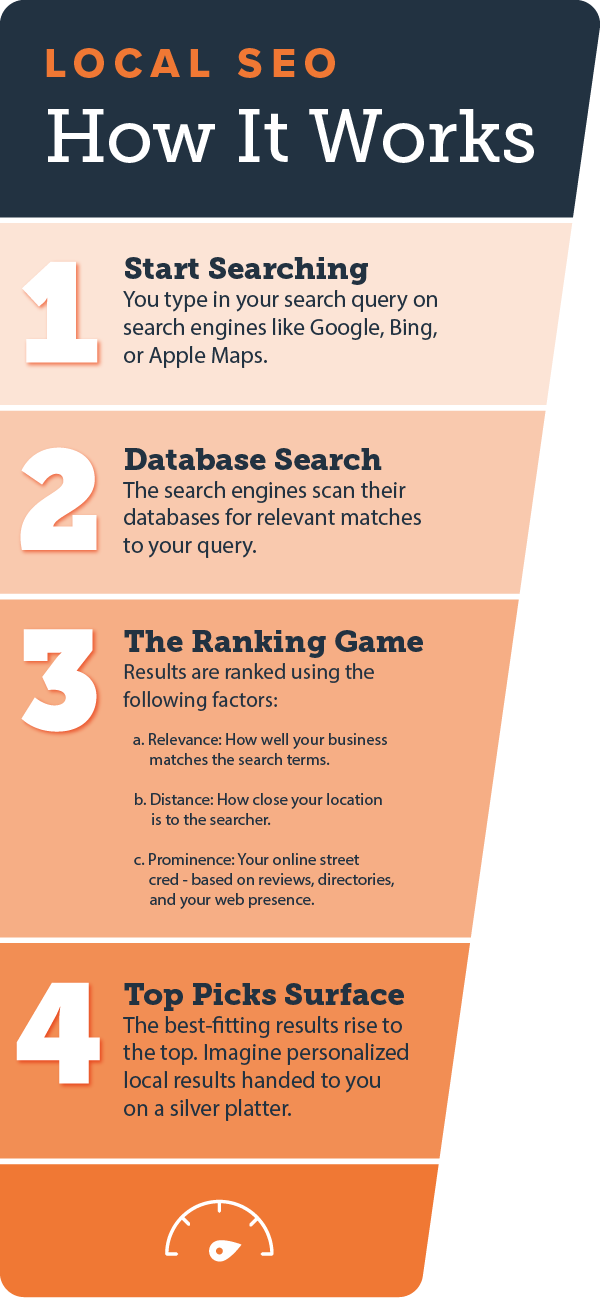
Mostly, local SEO works the same way as a traditional search. When you type in a query, your search engine (like Google, Apple Maps, Bing, etc.) sorts through its database to serve up the best matches for your request.
Then, it ranks those matches by most helpful to least helpful based on its unique local search ranking factors. The main three factors for Google are:
- Relevance: How well your business matches a search query
- Distance: How far your location is from the searcher
- Prominence: How well-known and well-regarded your business is in online search directories, reviews, and other parts of the web
Google displays two types of search results for local searches—Google Map Pack and organic search results.
Google Map Pack
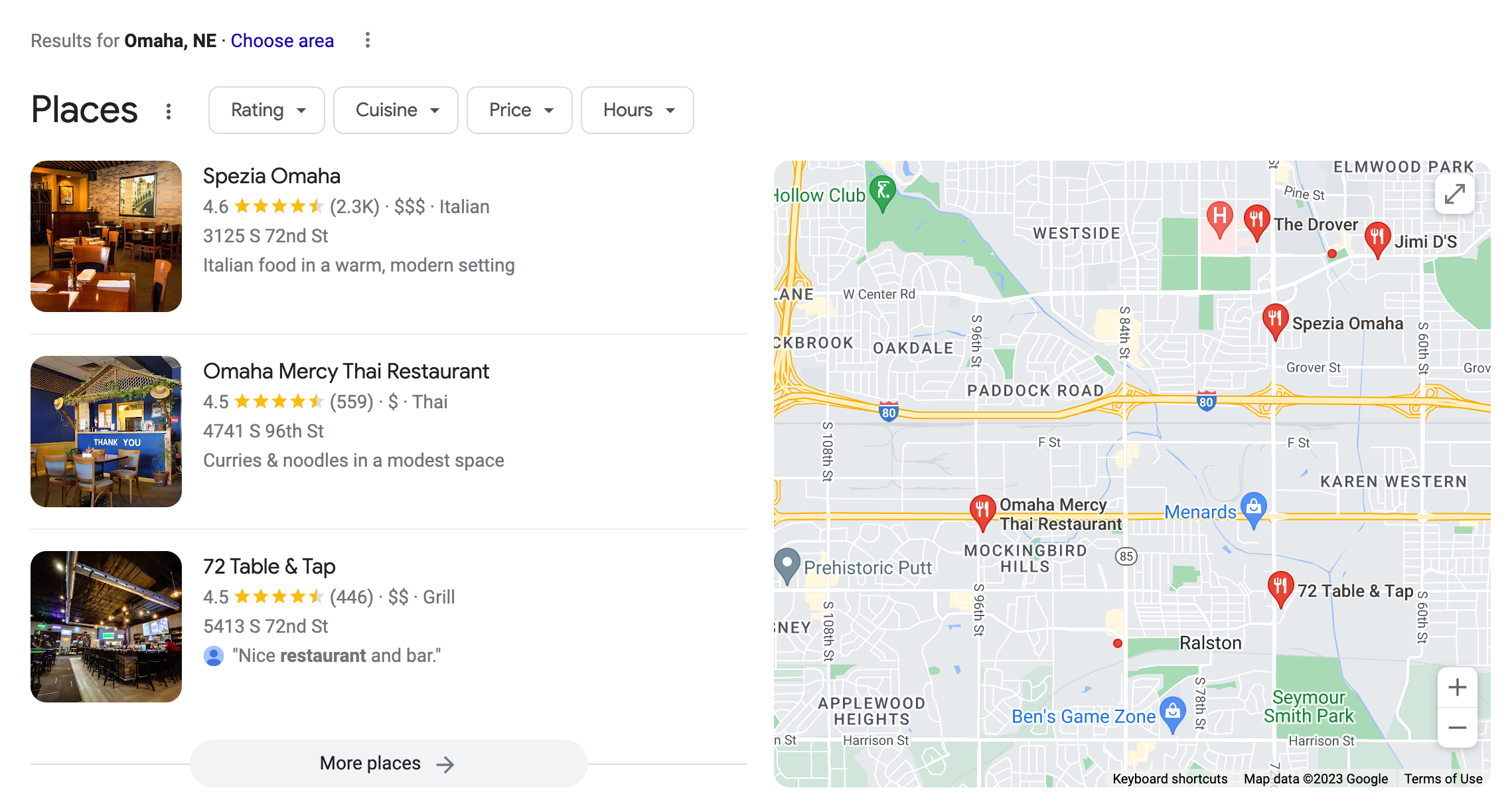
The Google Map Pack, also known as the local pack or 3-pack, is a SERP feature that shows the top three nearest physical business locations on Google Maps. The local pack shows up above organic search results and includes a map pin and listing for each of the three locations. To have a chance at being featured in the Google Map Pack, your business must have an active Google Business Profile.
Organic Search Results
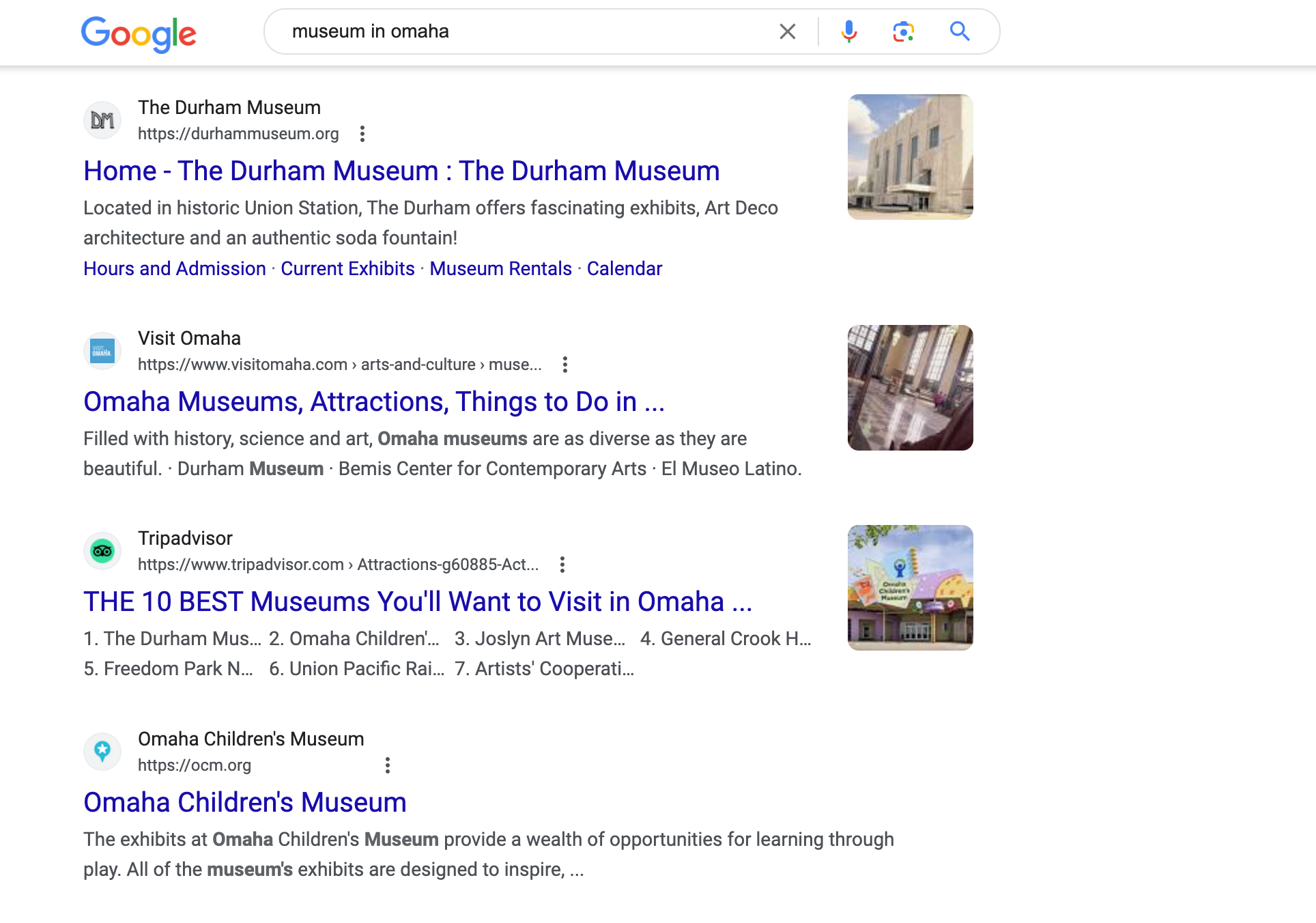
Organic local search results show up below the Map Pack and include all of the highest-ranking website results for a search. They’re probably what you immediately think of when you picture search results. You don’t need an active Google Business Profile to rank here—all you need is a website.
How to Optimize for Local Search Results
Here’s a step-by-step guide to getting started with local search optimization:
- Manage your Google Business Profile
- Clean up your local citations
- Optimize your small business website
- Interact with your business’ reviews
- Build a quality backlink profile
1. Manage Your Google Business Profile
Google Business Profile optimizations do a lot of legwork for ranking in the Google Map Pack–and as the leader of the search engine market, it’s a great place to start ranking in local search results. Here’s what you can do to optimize your Google Business Profile.
Claim Your Google Business Listing
Claiming your Google listing is the first thing you need to do on Google Business Profile. If you don’t, you won’t be able to access or change any part of your profile. Plus, Google will often only suggest claimed listings to searchers.
Choose the Right Business Categories
Your primary and secondary business categories are a searcher’s first look at what your business offers. Make sure you choose the right categories to describe the main functions of your business. If you aren’t sure where to start, check out your competitors’ categories or use our free category recommendation.
Update Your NAP Data
Accurate and consistent NAP (name, address, and phone number) data is one of the biggest positive signals to Google. Make sure your business name, address, and phone number are correct and the same across all of your directory listings, not just Google Business Profile.
2. Clean Up Your Local Citations
Local citations are a small business’ best friend. Even if your website isn’t ranking super high in certain local search results, a local citation platform like Yelp, TripAdvisor, or your city’s chamber of commerce business directory could be ranking you well instead. Here’s what you should be doing to optimize your local business listings.
Audit Your Citations
When you first start managing your local citations, you need to know where and how your business is showing up online. A free local citation audit can reveal how your business is performing across different local citations platforms and where your business information may be incorrect.
Claim Your Listings
Just like your Google Business Profile, you won’t be able to edit any of your business details until your claim your local citations. Go through and claim your business on each platform where you have an existing listing–even if information is currently accurate.
Standardize NAP Data
Remember that standard NAP data format you used for Google Business Profile? Each of your local citations should match it. This makes it easier for search engines to find your business information across different sources, making them more likely to rank your business.
Look at Your Competitors
If some of your local business listings aren’t performing as well as you’d like but you don’t know how to improve them, take a look at your high-ranking competitors. Are their business descriptions structured or written differently than yours? Do they have more information included in their listing that you missed? Are they using different categories than you? Test out several optimizations like these to see which work for your business.
3. Optimize Your Small Business Website
You need a small business website. There are many reasons why having a website is important—the biggest being that it’s the gateway to ranking in local search results. Here’s how you should optimize your website to rank in local search results.
Conduct Keyword Research
Keywords are a big indicator of your page’s relevance, one of Google’s key ranking factors. You should add keywords to all of the written content on your website—from meta descriptions to headers to body copy.
Just make sure you incorporate them naturally. Search engines prioritize keyword quality over quantity, meaning websites that have keywords woven into useful, readable content usually perform better than websites that simply list relevant keywords over and over (a negative SEO practice called keyword stuffing).
To do simple keyword research, you can begin with a general keyword (like your primary business category), type it into a search engine (like Google), and check the suggested searches.
There are also plenty of SEO tools that help with keyword research!
Make Location & Service Pages
Location pages are like extra local citations that you create and fully manage. Similarly, product and service pages are more opportunities to advertise what your business does in detail.
All of these pages give you a chance to rank in more specific search results. So, while your dentistry homepage might not appear high in search results for “dental crowns in Minneapolis,” for example, your dental crown service page or Minneapolis location page could!
Optimize HTML Tags
HTML tags are the behind-the-scenes heroes of your webpages. They include your meta description, SEO title, H2s/H3s/H4s, alt text for images, and so much more. They’re what search engines read and use to feature your business on search engine results pages (SERPs).

For proper HTML tag optimization, you’ll want to use your main keywords and pay attention to character count. SEO titles should be around 65 characters, and meta descriptions should be around 156 characters.
4. Interact With Your Business’ Reviews
Reviews are a customer’s way of fact-checking your business. Are you legitimate? Do you treat customers well? People want to hear all about your operations from a more objective party (i.e. other people like them) to be sure they’re choosing the right business. Here are a few local SEO tips you need to follow to leverage your online reviews.
Get Reviews
The best way to get more reviews is to simply ask. After customers make a purchase or complete any kind of interaction with your business, ask them to write a review about their experience. Some platforms (like Google) create a link to your business’ review page that you can share with customers.
Respond to Reviews
Once you have reviews, your work isn’t over. Responding to reviews lets your customers know that you care about their input, and if you consistently respond, it can motivate customers to leave more reviews. For better customer service and an indirect assist to your local search optimization strategies, it’s equally important to respond to negative reviews as well as positive reviews.
4. Build a Quality Backlink Profile
Backlinks (or inbound links) are like votes of confidence from other websites. Search engines can see how many websites link to your content, proving that other people trust you and your content enough to promote and share it on their site. Here’s how to get more backlinks and use them to build a stronger SEO strategy for your small business.
Reach Out to Local Directories
Local business directories (like Apple Business Connect, TripAdvisor, Yelp, Angi, Nextdoor, and industry-specific platforms) are a great place to promote your business, but many of them won’t automatically add you or link to your website. Take your NAP data and website link and submit it to local business directories to get listed.
Internally Link to Your Webpages
The more your pages are linked, the more important those pages are in the eyes of a search engine. This SEO best practice has secondary benefits, too, like making it easier for users to navigate your site and spend more time exploring your pages, both positive signals to Google.
But how should you link internally? Link your own product and service pages as resources on your home page, in FAQs, and in blog posts.
Contribute to Relevant Communities
As a small business owner, making strategic partnerships and being active in your community can pay off.
You might join a local forum, comment on thought leadership groups, promote nearby small business owners’ social posts, host a virtual neighborhood event, or share your expertise in another way to get the word out about your business.
All of these are great options for building brand awareness and encouraging potential customers and news outlets to check out your business and link to your content in the future.
Best Local SEO Tools for Beginners
Local search optimization doesn’t require a steep learning curve, especially if you know which tools to use to make your research and implementation processes faster. Whether you’re just starting out or you want to automate your current local SEO strategy, here are a few of our favorite paid and free SEO tools to make your work easier and error-free.
Keyword Research
- Google Keyword Planner: Gives keyword suggestions, keyword volume, and likelihood of ranking for keywords.
- GrowthBar Keyword Research: Tracks keyword volume, related keywords, and difficulty score for keyword ranking.
- Semrush SEO Keyword Research Tools: Toolkit for managing and finding new keywords.
- Wordstream Free Keyword Tool: Suggests keywords and gives search volume and competition level.
Link Building
- BuzzStream: Finds link opportunities and helps with creation and management of outreach emails.
- Hunter.io: Tracks down email addresses online so you can reach out to prospects.
- NinjaOutreach: Helps with link-building outreach with automated email campaigns.
- Majestic: Identifies your best-performing competitors and their top backlinks.
Local Business Listing Checkers
- Local Search Fuel Business Listing Checker: Free local listings scan for NAP data across 85+ platforms.
- Semrush Listing Management: Manage, distribute, and edit information for all your local citations.
- Whitespark Local Citation Finder: Tracks existing local citations and gives recommendations for citation opportunities.
Local Search Rank Checkers
- Local Falcon: Tracks local search results and local pack rankings at different location nodes throughout an area.
- Semrush Local Rank Tracker: Tracks your ranking for up to five keywords across multiple zip codes.
- Whitespark Local Rank Tracker: Tracks local pack and organic search rankings in Google and Bing across specified areas in your city.
Local SEO Audit
- Screaming Frog SEO Spider: Crawls your website for common SEO issues.
- Semrush On-Page SEO Checker: Analyzes website SEO and recommends improvements.
Reputation Management Tools
- Birdeye: A top-rated all-in-one platform for reputation and customer experience.
- ReviewTrackers: A cloud-based solution for reputation and review management.
- Yext: Overall good for managing local reputation.
Multi-Use Local SEO Tools
- Ahrefs: Competitor analysis, website audit, keyword research, link opportunity, and rank tracking tools.
- BrightLocal: Local rank tracking, local SEO audit, citation building, and review management.
- GeoRanker: Rank tracking, keyword research, and local listings management tools.
- Google Search Console: Search analytics, website crawling, and website audit.
- Moz Local: Business listing and review management tools with reporting and insights.
Need help getting started with improving your local search optimization? Local Search Fuel by Hurrdat has affordable local SEO services like Google Profile Boost, small business website development, and other local search starter deals to make your online presence the best it can be. Get started today!

Stefanie Vanderbeek
Stefanie Vanderbeek is a content strategist and writer who specializes in long-form digital content and website SEO optimization. Stefanie earned her Bachelor of Journalism from the University of Nebraska-Lincoln in Advertising and Public Relations in 2021. In her free time, you can find Stefanie reading, deep diving into video game lore, singing in her professional vocal group, or traveling the world!
